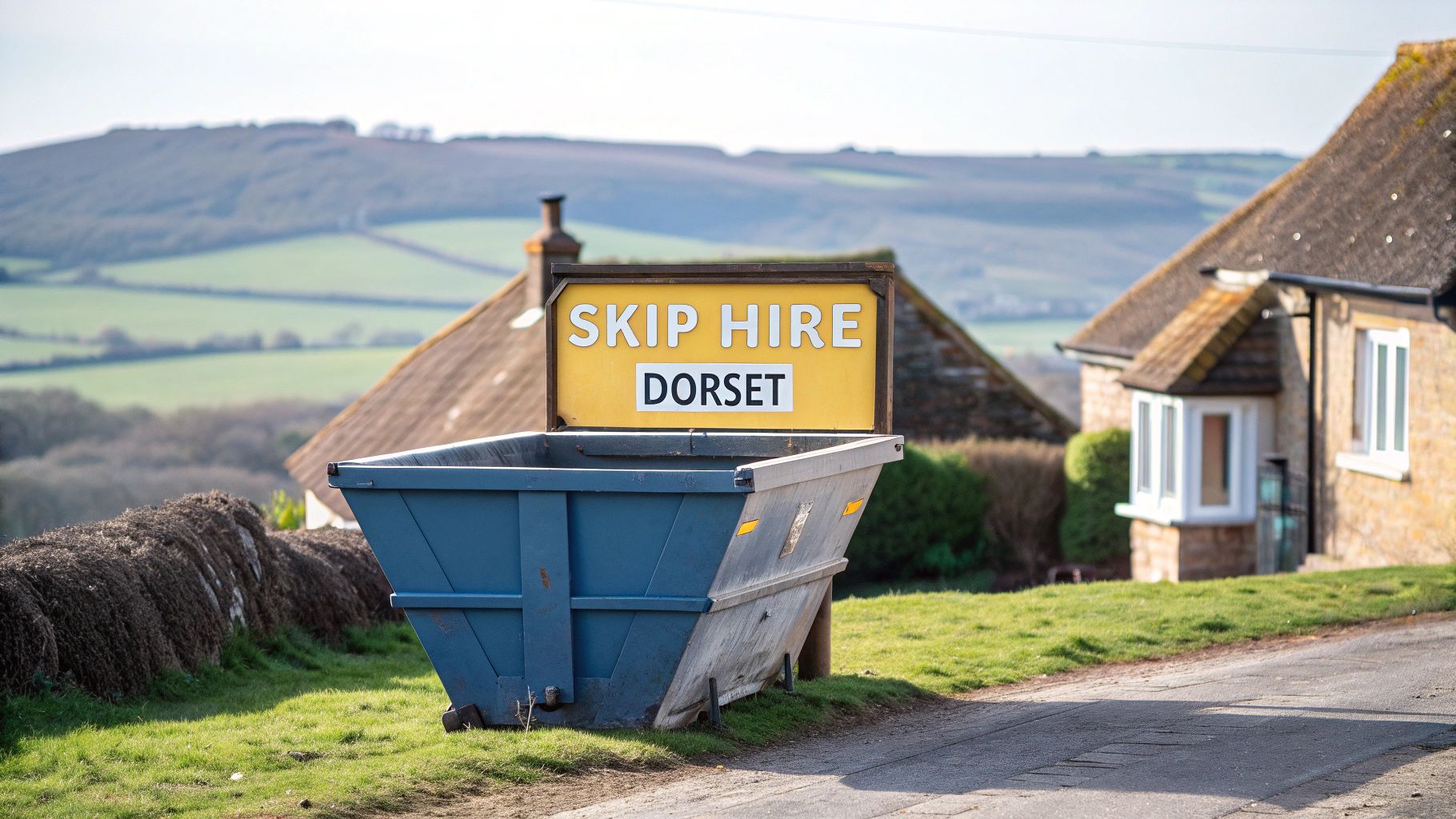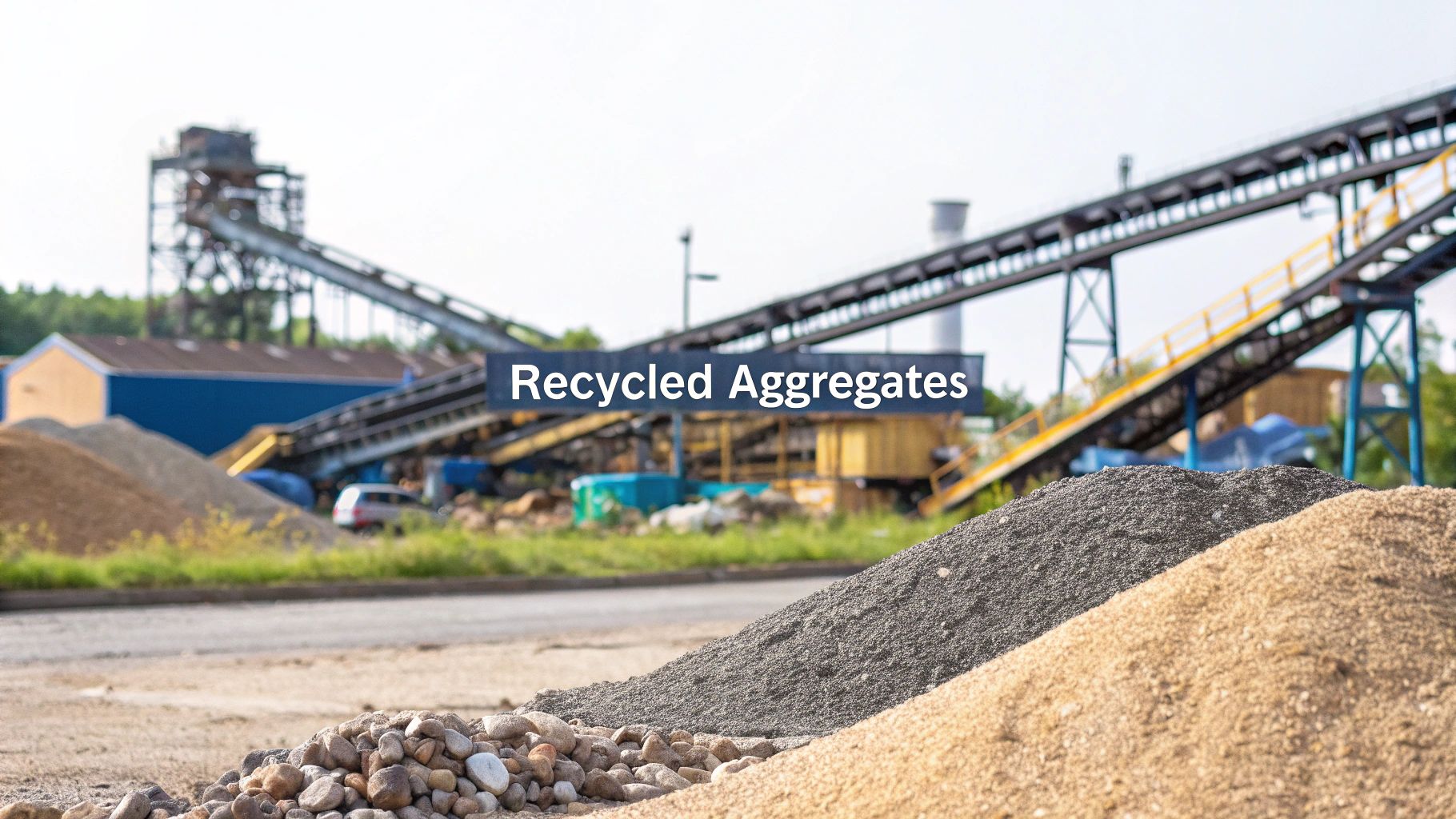Your Guide to Skip Hire in Dorchester
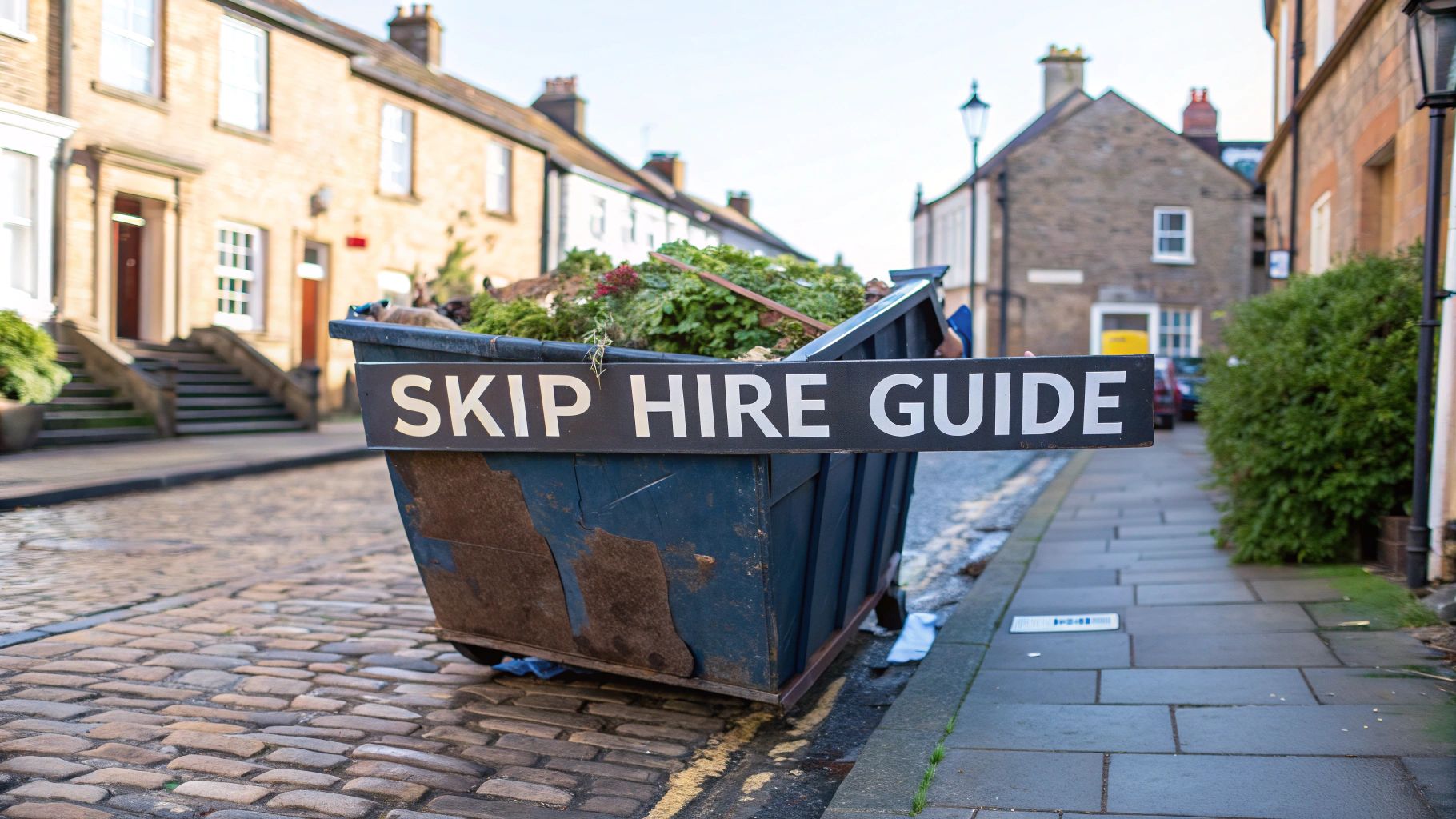
Your Guide to Dorchester Skip Hire
Getting your Dorchester skip hire sorted starts with one crucial decision: choosing the right size.
Honestly, getting this wrong is the difference between a smooth project and a costly, frustrating headache. It’s the single most common mistake I see people make, and it almost always leads to the extra expense of hiring a second skip.
Choosing the Right Skip for Your Dorchester Project
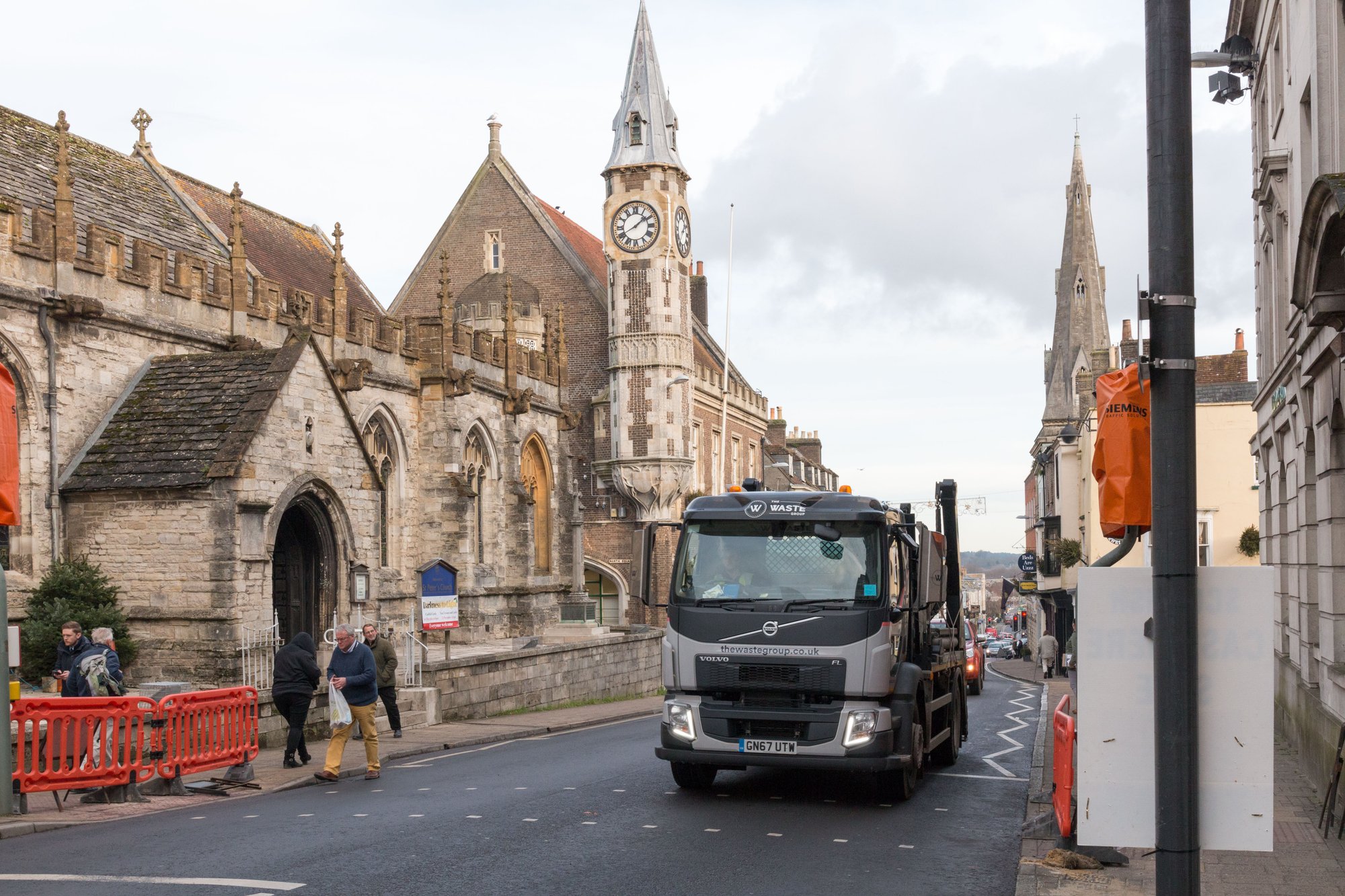
The skip you need depends entirely on what you’re tackling. Trying to visualise waste in cubic yards is notoriously tricky for most people, so let’s break it down into real-world scenarios you’d find around Dorchester. This is the best way to avoid the classic pitfall of underestimation.
Matching Skip Size to Your Job
A 2-yard ‘mini’ skip is your best friend for those smaller tasks. Think of it as perfect for a weekend garden clear-out, decluttering a single room, or getting rid of soil and turf from a small landscaping job. It holds roughly 20-30 bin bags.
Moving up, the 4-yard ‘midi’ skip is one of our most popular choices for domestic jobs. It’s the ideal size for a complete kitchen or bathroom renovation, comfortably holding the old units, tiles, and fittings. This skip will take around 30-40 bin bags worth of waste.
For more substantial projects, a 6-yard skip is a common sight on driveways across the county. This size is brilliant for a small house clearance, a bigger garden project involving bulky waste like an old shed, or the debris from minor building work. It’s capable of holding approximately 50-60 bin bags.
Finally, the 8-yard ‘builder’s’ skip is the largest size you can typically get for heavy waste like soil and hardcore. It’s the standard for construction sites and major home renovations, such as a full house extension or clearing out an entire property. This one can handle around 70-80 bin bags.
Dorchester Skip Size Guide: Which One Do You Need?
To make it even simpler, here’s a quick reference table. It’s much easier to picture bin bags than abstract cubic yards when you’re trying to figure out what you need.
| Skip Size (Cubic Yards) | Common Name | Approximate Bin Bag Capacity | Ideal For Project Type |
|---|---|---|---|
| 2 Yard | Mini Skip | 20-30 | Small garden tidy-ups, minor room clear-outs, soil disposal. |
| 4 Yard | Midi Skip | 30-40 | Kitchen or bathroom renovations, larger garden waste. |
| 6 Yard | Small Builder’s Skip | 50-60 | Bulky waste, small house clearances, mixed construction waste. |
| 8 Yard | Large Builder’s Skip | 70-80 | Major renovations, full house clearances, heavy construction debris. |
This table should give you a solid starting point for matching a skip to your project’s scale.
My Pro Tip: If you’re stuck between two sizes, always go for the larger one. The price difference is far less than the cost and hassle of having to order a second skip because the first one was too small.
This trend towards a wider range of skip sizes really reflects a shift we’ve seen in the UK market. In recent years, there has been a noticeable pivot from new-build construction towards refurbishment and repair projects. This has naturally increased demand for smaller, more specialised skips, rather than just the huge containers needed on big building sites.
For a more detailed breakdown of what can go in each skip and how to estimate your waste volume, our guide on choosing the right skip size provides even more specific advice.
Decoding Dorchester Skip Hire Prices
When you get a quote for a Dorchester skip hire, it’s tempting to just look at the final number. But what you’re really paying for is a whole service, not just a big metal box on your drive for a week or two. That price covers everything from the delivery and collection right through to the responsible sorting and disposal of your waste.
Getting your head around what actually goes into that cost helps you see the real value. It means you can compare quotes from different companies properly, making sure you’re getting a fair deal without any nasty surprises later on.
Key Factors That Shape Your Quote
A few key things have a direct impact on how much you’ll pay for a skip in Dorchester. The most obvious one is the skip size – bigger skips cost more simply because they hold more waste, which is heavier and costs more to handle and process.
The hire period also plays a part. Most companies offer a standard hire of one to two weeks, but if you need it for longer, you can usually expect to pay a bit extra. Think of it like renting a car; the longer you have it, the more it costs.
Another massive factor is the type of waste you’re getting rid of. A skip full of ‘clean’ inert waste like soil and rubble is generally cheaper to process than one with mixed general waste, which has to be taken to a waste transfer station for careful sorting.
It’s easy to forget, but a big chunk of your skip hire fee goes towards what happens after it’s collected. This covers the labour for sorting all the materials, the energy needed for recycling, and government-mandated fees like landfill tax.
All this behind-the-scenes work is crucial for managing waste properly and making sure we’re all doing our bit for the environment.
Understanding Landfill Tax and Its Impact
One of the biggest drivers behind rising skip hire costs is government legislation, specifically the landfill tax. It’s a tax designed to make sending waste to landfill more expensive, pushing everyone towards recycling instead. This puts huge cost pressures on the entire UK skip hire industry.
For example, in 2025, the standard rate for landfill tax shot up to £126.15 per tonne. To put that in perspective, it was just £91.35 per tonne back in 2019. That’s a nearly 38% hike in just a few years, which directly increases the disposal costs for skip companies – a cost that inevitably finds its way into customer pricing.
So, when you see prices go up, it’s not always the company being greedy. More often than not, it’s a direct response to national policies that affect the entire waste management industry. Naturally, customers in places like Dorset feel the knock-on effect of these regulatory changes.
How to Compare Quotes and Spot Hidden Fees
When you’re shopping around for a skip in Dorchester, don’t let the headline price be your only guide. Sometimes a cheaper initial quote can end up costing you more once all the extras are tacked on.
Here are a few things to ask about to make sure you’re getting a truly transparent price:
- Delivery and Collection: Are these charges bundled into the main price, or will they be added on top?
- Permit Costs: If your skip needs to go on a public road, you’ll need a council permit, which has a fee. Check if this is included or if it’s an extra.
- Weight Limits: Some firms have very strict weight limits, especially for the bigger skips. Go over it, and you could be hit with some hefty surcharges.
- Wasted Journey Fees: If the driver turns up but can’t deliver or collect the skip because something is in the way (like a parked car), you might be charged for their time.
Asking about these potential costs upfront will help you make a much more accurate comparison between different providers. You can also take a look at our detailed guide on the average skip hire prices in Dorset to get a better feel for the local market. Being well-informed is your best defence against unexpected costs and budget blowouts.
Handling Skip Permits on Dorset Roads

One of the first questions I ask customers is, “Where’s the skip going to live?” It’s a detail that’s easy to overlook but can completely change your game plan. If you’ve got a spacious private driveway, you’re golden. But if the only spot is on the street, you’ll need to think about council permits.
Placing a skip on any public highway without the proper paperwork is a big no-no and can land you with some hefty fines from Dorset Council. And it’s not just the road itself – this rule covers pavements, grass verges, and any bit of land the public has access to. The bottom line is simple: if it’s not your private property, you need a permit.
When You Need a Permit and Who Sorts It Out
The thought of dealing with council bureaucracy for your Dorchester skip hire might make you groan, but it’s usually a pretty painless process. The best part? You don’t have to handle the paperwork yourself. Your skip hire company will apply to Dorset Council for you.
There’s a good reason for this. The council needs to know that the company placing the skip is properly registered and has the right public liability insurance. When you book, just make it clear that the skip will be on a public road. They’ll manage the application and add the permit fee to your final bill.
But you do need to factor this into your timing. These things aren’t instant.
Permit applications can take a little while. I always tell people to allow at least 3-5 working days for Dorset Council to give it the green light. So, don’t book a skip for Monday morning if you only remember about the permit on the Friday before – it simply won’t arrive on time.
A bit of forward planning here saves a lot of headaches and keeps your project running smoothly right from the get-go.
Understanding the Costs and Conditions
The cost of a skip permit is set by Dorset Council, not the hire company. While prices can vary, it’s a non-negotiable part of the budget if you’re putting a skip on public land. The fee covers the admin work and ensures your skip is registered and safe for the public.
Once that permit is granted, it comes with a few strings attached. These are legal requirements, not just friendly suggestions, designed to keep everyone safe.
Here’s what you can generally expect:
- Be Seen, Be Safe: The skip must be highly visible. This usually means it has to be a bright colour (like yellow) with reflective markings at each end.
- Lights On: If your skip is staying out overnight, it needs lights. Safety lamps are typically placed on each corner so drivers and cyclists can spot it in the dark.
- Cone Zone: You’ll need traffic cones to guide vehicles safely around the skip, creating a buffer that alerts drivers well in advance.
Ignoring these rules can lead to fines, and in some cases, the skip might even be removed immediately. If you want to get into the nitty-gritty, you can learn more about when a skip permit is necessary in our detailed guide.
Ultimately, getting the permit sorted correctly is just part of a responsible, stress-free hire. It keeps you on the right side of the law and ensures the safety of your neighbours. Any decent local firm will know the exact requirements for Dorchester and make the whole thing feel effortless.
Loading Your Skip Like a Pro
Right, the skip’s on your drive. The temptation is to just start chucking everything in and get it over with, but hold on a moment. A little bit of thought at this stage can save you a world of pain later.
Loading a skip properly isn’t just about cramming more in; it’s about safety and making sure the driver can actually take it away when the time comes. There’s a real knack to it, but it’s easy once you know how. It all starts with looking at the junk you’ve got and thinking about its shape and weight before you lift a single thing.
Laying the Groundwork: A Smart Loading Strategy
The secret to a well-loaded skip is building a solid base. Start by finding your flattest, largest items. Think old doors, bits of fencing, dismantled wardrobes, or any sheets of wood you might have. Lay them down flat on the bottom. This creates a stable, level floor to build on.
With that flat base in place, it’s time for the heavy hitters. Any dense, bulky stuff like broken bricks, chunks of concrete, or soil should go in next. Piling these materials low down keeps the skip’s centre of gravity where it should be, preventing it from becoming dangerously top-heavy.
Now you can start filling in the gaps with the lighter, more awkward-shaped items. And remember to break things down! A flat-packed chest of drawers takes up a fraction of the space it would assembled. People often call this the “Tetris method,” and for good reason – the aim is to slot everything together and leave no empty space.
Key Takeaway: You’re trying to eliminate those wasteful pockets of air. A tightly packed skip means you’ve got the most for your money and you’re far less likely to find you need to order a second one for your Dorchester skip hire.
This chart gives you a good sense of how much extra space you get as you go up in skip size.
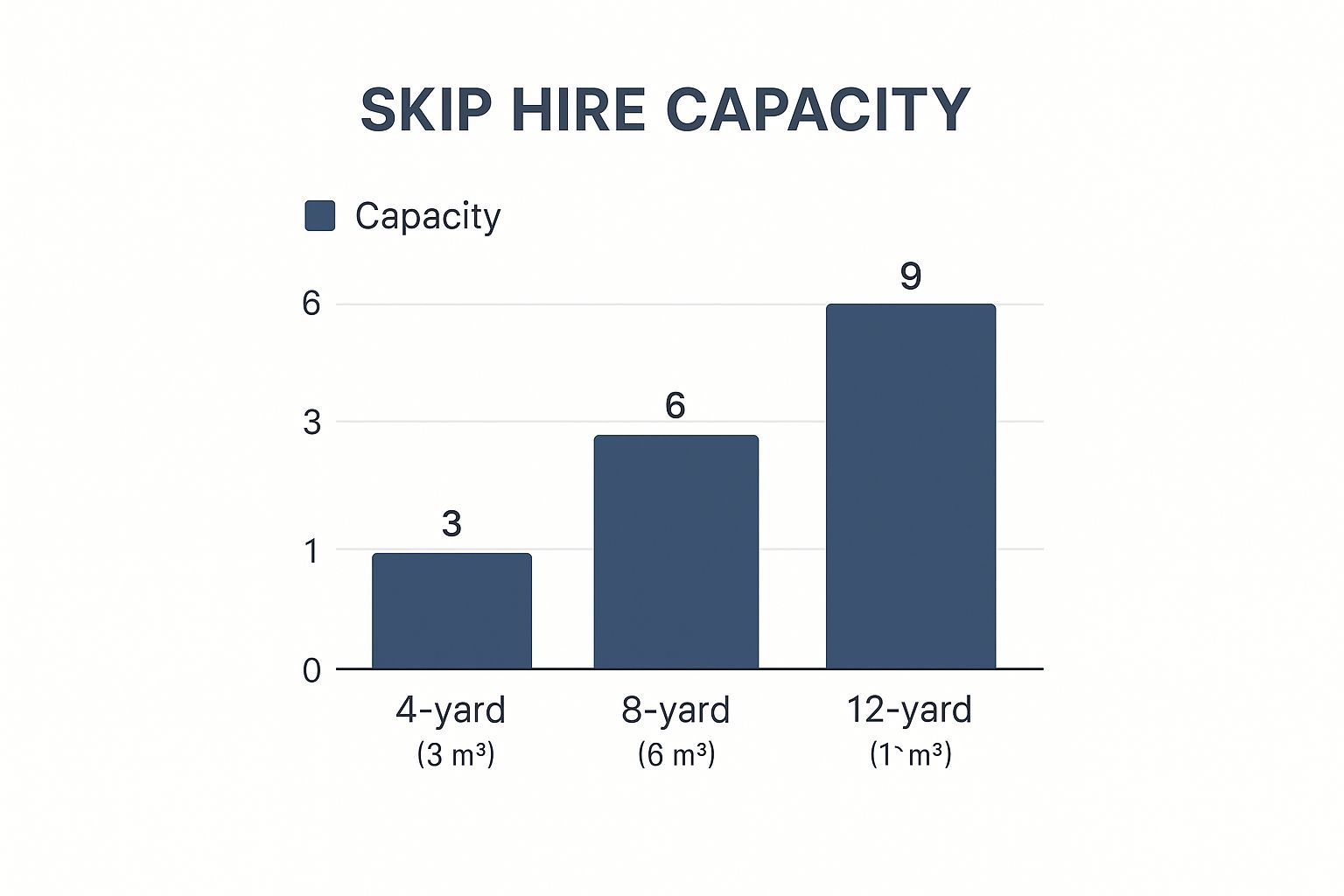
As you can see, jumping from a 4-yard to an 8-yard skip literally doubles your capacity, a massive difference that can make or break bigger clear-outs.
The Level Load Rule: Why It’s Non-Negotiable
This is probably the single most important rule of hiring a skip: the level load limit. You’ll spot a fill line painted along the inside walls of the skip. That line isn’t a suggestion; it’s a legal requirement for transporting waste safely on UK roads.
An overfilled skip is a serious hazard. Bits of debris can easily fly out on the road, creating a real danger for other cars, cyclists, or anyone walking by. Because of this, skip lorry drivers are legally bound to refuse to collect any skip that’s been overloaded.
If that happens, you’re left in a bind. You’ll either have to clamber in and empty out the excess yourself, or you’ll have to pay the hire company extra to sort it out for you. It’s a frustrating, costly, and completely avoidable delay to your project.
What Can and Cannot Go in Your Skip
Just as crucial as how you load the skip is what you put inside it. Some items are strictly forbidden because they’re classed as hazardous and need to be disposed of by specialists. Tossing them into a general waste skip can result in some eye-watering fines and cause serious environmental damage.
It’s always best to check with your specific provider, but here’s a rundown of what you can and can’t chuck in.
What Can and Cannot Go in Your Skip
| Waste Item | Generally Permitted? | Important Notes / Disposal Advice |
|---|---|---|
| Wood, Metal, Plastic | ✅ Yes | Break down large items to save space. |
| Bricks, Rubble, Soil | ✅ Yes | Perfect for the bottom layer, but don’t overfill as they’re heavy. |
| Furniture & Carpets | ✅ Yes | Dismantle furniture where possible. |
| Garden Waste | ✅ Yes | Includes soil, branches, leaves, and grass. |
| Cardboard & Packaging | ✅ Yes | Flatten all boxes to maximise room. |
| Asbestos | ❌ No | Extremely hazardous. Requires licensed specialist removal. Never break it. |
| Plasterboard | ❌ No | Must be disposed of separately. Some firms offer specific plasterboard bags. |
| Electricals (WEEE) | ❌ No | Fridges, TVs, microwaves, computers. Take to a local recycling centre. |
| Batteries & Light Bulbs | ❌ No | Many supermarkets and recycling centres have dedicated collection points. |
| Paint, Solvents, Oil | ❌ No | These are hazardous chemicals. Your local council will have disposal guidance. |
| Tyres & Gas Cylinders | ❌ No | Require specialist disposal services; do not place in a skip. |
Getting to grips with these rules before you start saves you from any nasty surprises like a refused collection or an unexpected bill. Any decent Dorchester skip hire company will give you a clear list of what they won’t accept. If you’re ever in doubt about an item, just give them a call and ask.
Finding a Reputable Dorchester Skip Hire Company
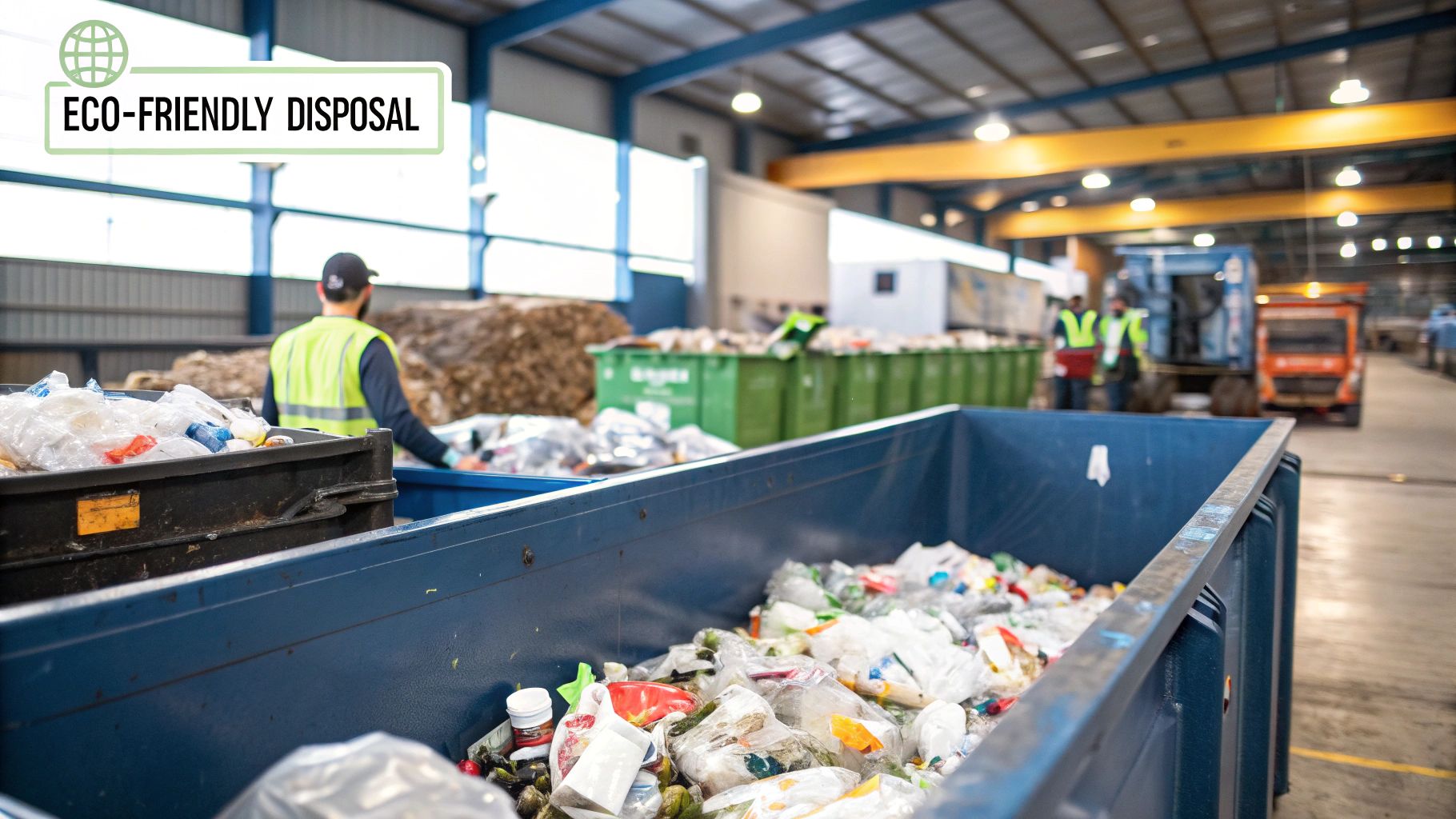
Picking the right company for your Dorchester skip hire is just as important as choosing the correct skip size. A great provider makes the whole thing feel effortless, while a bad one can lead to missed collections, hidden fees, and even legal headaches. You’re looking for a reliable partner, not just the cheapest quote you can find.
Before you do anything else, you absolutely must check that the company has a valid Waste Carrier Licence. This is a non-negotiable legal requirement from the Environment Agency, proving they’re authorised to handle and dispose of waste properly. Never, ever hire a company that can’t show you this licence number.
The Importance of a Waste Carrier Licence
Working with an unlicensed operator is a massive gamble. You’re often just dealing with a “man with a van” who will happily take your cash and then dump your waste in a field or lay-by. This is fly-tipping, a serious environmental crime.
And here’s the kicker: if that waste is traced back to you, you’re the one who could face a hefty fine. As the person creating the waste, you have a legal ‘duty of care’ to make sure it’s handled by a legitimate, licensed firm. That responsibility doesn’t vanish when the lorry drives away.
A reputable company will have their Waste Carrier Licence number displayed on their website and vehicles. If you can’t spot it, ask for it. If they get shifty or can’t provide it, that’s a huge red flag. Walk away.
This simple check protects you, keeps the beautiful Dorset countryside clean, and ensures you’re working with professionals who take their legal duties seriously.
What to Look For Beyond the Licence
Once you’ve confirmed they’re operating legally, it’s time to dig a bit deeper. A truly reliable local company doesn’t just drop off a metal box; they offer a complete, stress-free service.
Here’s a quick checklist to help you sort the good from the great:
- Transparent Pricing: Are their prices clear and upfront? A good company will break down the costs for the skip, delivery, collection, and potential extras like permit fees without you having to ask.
- Positive Local Reviews: See what people are saying on Google or Trustpilot. Look for recent feedback from customers in the Dorchester area mentioning things like punctuality, friendly communication, and helpful drivers.
- Responsive Customer Service: How do they handle your first call or email? A professional team will be happy to answer questions, advise on sizes, and explain the process. If they’re hard to reach or dismissive now, just imagine what they’ll be like if a problem crops up.
- Local Expertise: A Dorchester-based firm knows the area. They’ll understand the specific rules from Dorset Council, be familiar with tricky access roads, and have good relationships with local waste transfer stations.
The Crowded Market and Why Service Really Matters
The UK skip hire market is incredibly competitive. In fact, recent analysis shows that the sector saw 0% growth in the last measured year, with very few firms managing to expand. This points to a crowded marketplace where companies often end up competing fiercely on price, squeezing their own profit margins. You can read more about the skip hire market on plimsoll.co.uk.
In a market like this, excellent customer service and sheer reliability are what make a company stand out. The ones who invest in professional staff, well-maintained vehicles, and responsible waste management are the ones built to last—not just the ones trying to win a race to the bottom on price. That commitment to quality is what guarantees your project runs smoothly and your waste is handled correctly.
Common Questions About Dorchester Skip Hire
Even after going through all the steps, it’s natural to have a few questions rattling around. Hiring a skip isn’t something most of us do every week, so getting the little details sorted brings peace of mind.
Think of this as a final Q&A session to tackle the most common things people ask us about Dorchester skip hire. We’ll clear up any last-minute uncertainties so you can book your skip feeling totally in control.
How Long Can I Keep The Skip For?
One of the first things everyone wants to know is how long they can have the skip. Most skip hire companies in Dorchester work on a standard hire period of 7 to 14 days. For the vast majority of projects, like a garden clear-out or a small bathroom rip-out, this is plenty of time.
Of course, things don’t always go to plan. If you’re a whirlwind and get the job done early, a quick call is usually all it takes to arrange for a speedier collection. On the other hand, if you hit a snag or the job turns out to be bigger than you first thought, you can almost always extend the hire. Just be aware this will likely come with an extra daily or weekly charge.
It’s always best to be open about your timeline right from the start. Have a chat with the company when you book, and they’ll run you through their specific policies on extensions and what it might cost. No one likes a surprise on the final bill.
A little bit of planning here ensures the hire period fits your project like a glove, without any unnecessary pressure or extra expense.
What Happens If I Put Prohibited Items In The Skip?
This is a big one, and a mistake you really want to sidestep. Tossing forbidden items like plasterboard, old batteries, fridges, or tins of paint into a general waste skip can cause some serious headaches. It’s not just about rules; these materials require specialist handling and can’t go through the normal waste sorting process.
When the skip gets back to the depot, the team gives its contents a thorough once-over. If they spot prohibited materials, one of two things usually happens. They might refuse to take the waste and call you to come and remove the offending items yourself – a surefire way to derail your project.
More often, they’ll handle the specialist disposal that’s legally required and pass the significant cost straight on to you. These charges can be surprisingly steep and will be added to your invoice.
- Always double-check: Before you start loading, have another look at the company’s list of banned items.
- When in doubt, ask: A quick phone call to your skip provider is a simple way to avoid a hefty bill.
- Plan ahead: Identify any hazardous items you need to get rid of and make separate, proper arrangements for them.
Do I Need To Be Home For Delivery Or Collection?
This really comes down to where the skip is going. If it’s being dropped on a clear, easily accessible private driveway with no obstacles in the way, then you probably don’t need to be there. As long as you’ve given clear instructions and paid upfront, the driver can get it sorted.
However, it’s always a good idea to be on-site if there’s any chance of a complication. This includes times when the driver might need to:
- Navigate a particularly tight access point.
- Get through a locked gate to reach the property.
- Place the skip in a very precise spot that you need to point out.
The same logic applies to collection. If the skip is easy to get to and hasn’t been overfilled, you generally don’t need to hang around for the pickup. The driver can just load it up and go. Just make sure you confirm this with your provider when you book your Dorchester skip hire.
What Are The Alternatives To Hiring A Skip?
A skip is a brilliant solution for getting rid of a decent amount of waste, but it isn’t your only option. For smaller clear-outs, other services might be a better fit and more friendly on the wallet.
If you’ve only got a few bulky things to shift, like an old sofa or a mattress, Dorset Council’s bulky waste collection service is worth looking into. Or, if you have a suitable car and don’t mind a bit of a trip, you can always take your waste to the local household recycling centre yourself.
Another popular choice is a ‘man and van’ rubbish clearance service. Here, a team comes to you, does all the lifting and loading, and you pay based on how much stuff they take away. It’s a great option if you can’t do the heavy work yourself.
The right choice really depends on three key things: the amount of waste you have, what you’re willing to spend, and how much of the work you want to do yourself.
Ready to get your project started with a waste solution that just works? At The Waste Group, we make Dorchester skip hire simple, transparent, and reliable. Book online in minutes or give our friendly team a call for expert advice.
